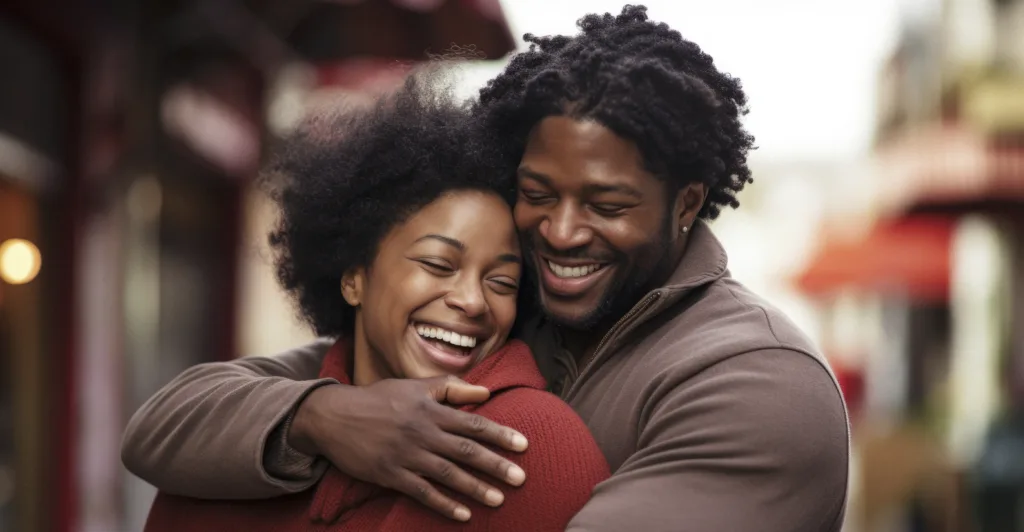Ah, love—the eternal enigma that poets, philosophers, and hopeless romantics have pondered for centuries. What is love, you ask? It’s the spark that ignites our souls, the magnetic pull that draws us closer, and the force that defies logic and reason. Love is the warmth of a tender embrace, the electricity of a shared glance, and the melody of laughter echoing in the air. It’s the steady anchor in life’s stormy seas, the beacon of hope in our darkest hours, and the gentle reminder that we are never truly alone. Love is both the question and the answer, the journey and the destination—a kaleidoscope of emotions, experiences, and connections that transcends time and space. So, what is love? It’s everything and nothing, simple yet infinitely complex—a mystery waiting to be explored, embraced, and cherished with every beat of our hearts.
Love is often portrayed as a tumultuous rollercoaster ride, filled with heartaches, tears, and drama. But what if we told you that love itself is not the culprit behind the pain we experience in relationships? In fact, it’s not love that hurts—it’s our attachments that do. Buckle up as we unravel this intriguing concept and explore a refreshing perspective on modern-day relationships.
Love, according to the keen minds of psychology, love is the intricate interplay of emotions, behaviors, and neurochemistry that binds us together in profound ways. From the depths of attachment theory to the heights of evolutionary psychology, experts paint a portrait of love as a multifaceted gem, each facet revealing a different hue of connection and intimacy. It’s the dance of neurotransmitters in our brains, the echoes of childhood experiences, and the foundation of our most cherished relationships. In the eyes of psychology, love is both a science and an art—a fascinating journey of exploration, understanding, and growth that captivates our hearts and minds alike.

Love, in its purest form, is a beautiful force. It’s the profound connection that binds us to others, fostering empathy, compassion, and growth. Love uplifts, empowers, and enriches our lives in countless ways. It’s the cornerstone of meaningful relationships, be it with friends, family, or romantic partners. So why, then, do so many of us associate love with pain?
The answer lies in our misunderstanding of attachment. Unlike love, attachment stems from a place of neediness, insecurity, and fear. It’s the desire to possess, control, and cling to another person, often at the expense of their autonomy and well-being. Attachment creates dependency and breeds expectations, setting the stage for disappointment and resentment when those expectations aren’t met.
The Myth of Love Hurts
We’ve all heard the age-old adage, “Love hurts.” But what if we challenge this notion and propose that love, in its purest form, is actually a source of joy, connection, and growth? It’s our attachments to certain outcomes, expectations, and identities that often lead to disappointment, frustration, and heartbreak in relationships.
Beneath the worn-out adage lies a truth waiting to be unveiled: the myth of “love hurts” is ready for retirement. Love isn’t a battlefield; it’s the sanctuary where souls find solace and strength. It’s time to debunk the myth that love is synonymous with pain and rewrite our love stories with ink dipped in joy, understanding, and unwavering support. Let’s embrace a new anthem where love uplifts, empowers, and thrives, debunking the old myth and paving the way for a future where love is our greatest ally, not our adversary.

Unpacking the Nature of Attachments
Attachments stem from our deep-seated desires for security, validation, and control within our relationships. When we become overly attached to specific outcomes or cling to unrealistic expectations, we set ourselves up for disappointment and pain. It’s these attachments that cloud our judgment, distort our perceptions, and hinder our ability to cultivate healthy and authentic connections with others.
Think of attachment as a tangled web of expectations, jealousy, possessiveness, and insecurity. It thrives on conditions and limitations, stifling the freedom and authenticity that true love embodies. When we confuse attachment for love, we set ourselves up for a cycle of suffering, constantly seeking validation and validation from external sources rather than cultivating self-love and acceptance.
But here’s the good news: once we recognize the difference between love and attachment, we open ourselves up to a world of possibilities in our relationships. We learn to love without expectations, to embrace others without trying to possess them. We understand that love isn’t about controlling or fixing someone; it’s about supporting and accepting them as they are.
The Liberation of Detachment
So, what’s the antidote to the pain caused by attachments? Enter the art of detachment. By letting go of rigid expectations, releasing the need for external validation, and embracing the impermanence of life, we free ourselves from the shackles of attachment. Detachment allows us to love more freely, authentically, and unconditionally, without placing undue burdens on ourselves or our partners.
Finally, it’s essential to practice detachment. This doesn’t mean cutting ourselves off from others or becoming indifferent; rather, it means letting go of our attachments to outcomes and expectations. When we release the need to control or possess, we free ourselves and others to love more deeply and authentically.
Navigating Relationships with Grace and Freedom
When we shift our focus from clinging to attachments to embracing detachment, we create space for genuine connection, growth, and mutual respect in our relationships. By letting go of our preconceived notions of how love should be and accepting things as they are, we open ourselves up to new possibilities and experiences that transcend the limitations of attachment.
In the intricate tapestry of relationships, grace and freedom are the golden threads that weave the most beautiful patterns. Imagine a voyage where communication flows effortlessly, where understanding is our compass, and where respect is our North Star. Navigating relationships with grace means embracing the ebb and flow of emotions, offering forgiveness, and celebrating each other’s uniqueness. And freedom? It’s the wind in our sails, propelling us forward while allowing space for growth and individuality. So, let’s embark on this journey with open hearts and open minds, navigating the seas of love with grace and freedom as our guiding lights.
Embracing the Journey of Self-Discovery
Ultimately, the path to freeing ourselves from the pain of attachments and rediscovering the true essence of love begins with self-discovery. As we learn to cultivate a deeper sense of self-awareness, self-love, and self-compassion, we pave the way for healthier, more fulfilling relationships built on a foundation of authenticity and mutual understanding.
So how can we cultivate love without falling into the trap of attachment? It starts with cultivating self-awareness and self-love. When we feel secure and whole within ourselves, we’re less likely to seek validation and fulfillment from external sources. We learn to fill our own cup first, allowing love to flow freely without the need for conditions or expectations.
Communication is also key. Honest and open communication fosters trust and understanding, allowing us to express our needs and boundaries without resorting to manipulation or control. When we approach relationships with transparency and vulnerability, we create a safe space for love to flourish, free from the constraints of attachment.
Redefining Love and Letting Go of Attachments
So, the next time you find yourself in the midst of relationship turmoil, remember this: Love does not hurt—it’s our attachments that do. By embracing the power of detachment, letting go of unrealistic expectations, and cultivating a deeper sense of self-awareness, we can create relationships that are grounded in love, freedom, and authenticity. Love is meant to uplift, inspire, and empower us—let’s release the attachments that no longer serve us and embark on a journey of love that is truly liberating.
In conclusion, love does not hurt; attachments do. By shifting our perspective and understanding the difference between love and attachment, we can transform our relationships into sources of joy, growth, and fulfillment. Let’s embrace this refreshing perspective and cultivate love that uplifts, empowers, and enriches our lives in ways we never thought possible.
Take away wisdom from Masvingo
In a world where love is often misconstrued as pain, let these words be your beacon of clarity: “Love does not hurt; attachments do.” This mantra is more than just a refreshing perspective; it’s a revelation that empowers us to redefine our relationships. It’s a gentle reminder that love, at its core, is pure and nurturing, while attachments can lead to anguish and heartache. So, let’s untangle ourselves from the web of possessiveness and expectations, and embrace a love that is unconditional and liberating. With this wisdom as our compass, we navigate the seas of relationships with grace and understanding, forging connections that are built on mutual respect and genuine affection.


Leave a Reply